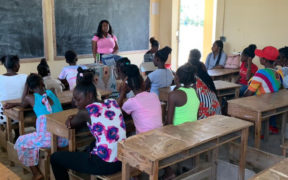Author:
Amanda Fata
Development Coordinator, Care 2 Communities
Amanda is a graduate of Lesley University in Cambridge, MA where she earned a bachelor’s degree in Global Studies. During her studies, she pursued her interests in global health and international development through her coursework as well as internships with various nonprofits, including Kupenda for the Children, an organization that provides medical intervention, education, and advocacy for children with disabilities in Kenya. At C2C, Amanda oversees institutional fundraising, focusing on grant writing and reporting, prospect research, partnership building, and peer networking. Her primary career goal is to help improve women's health outcomes globally and she currently works in research in the Division of Women's Health at Brigham and Women's Hospital.

Care 2 Communities (C2C) has developed a comprehensive sexual and reproductive health education program that is tailored to its community context in Haiti. This interview with C2C’s Managing Director Racha Yehia by Development Coordinator Amanda Fata highlights why and how C2C developed the program, and how it contributes to C2C’s vision.
Listen to “Inside the FP Story”
Grab a cup of coffee or tea and listen in on honest conversations with family planning program experts around the world as they share what has worked in their settings — and what to avoid — in our podcast series, Inside the FP Story.
Click on the image above to visit the podcast page or on your preferred provider below to listen to Inside the FP Story.
Stay Updated
with the latest trending news
About
Knowledge SUCCESS is a five-year global project led by a consortium of partners and funded by USAID’s Office of Population and Reproductive Health to support learning, and create opportunities for collaboration and knowledge exchange, within the family planning and reproductive health community.
Contact
Johns Hopkins Center for Communication Programs
111 Market Place, Suite 310
Baltimore, MD 21202 USA
Contact Us
This website is made possible by the support of the American People through the United States Agency for International Development (USAID) under the Knowledge SUCCESS (Strengthening Use, Capacity, Collaboration, Exchange, Synthesis, and Sharing) Project. Knowledge SUCCESS is supported by USAID’s Bureau for Global Health, Office of Population and Reproductive Health and led by the Johns Hopkins Center for Communication Programs (CCP) in partnership with Amref Health Africa, The Busara Center for Behavioral Economics (Busara), and FHI 360. The contents of this website are the sole responsibility of CCP. The information provided on this website does not necessarily reflect the views of USAID, the United States Government, or the Johns Hopkins University. Read our full Security, Privacy, and Copyright Policies.













